It has been reported that a British F-35 pilot realised the rain cover was still on and tried to abort take-off but was too late to stop the jet before the end of HMS Queen Elizabeth’s runway.
One of the carrier’s F-35B fighters, from 617 Squadron, crashed during operations in the Mediterranean last week. It is important to note that this is speculation and not confirmation.
In an exclusive here, Jereme Starkey was told:
“They knew almost right away. The covers and engine blanks are supposed to be removed before flight. The ground crew do it and they are incredibly strict. Then the pilot walks round.”
The pilot of the jet suffered minor injuries and was rescued by helicopter. Before assigning blame to anyone, it’s important to remember we do not have all (or perhaps any) of the facts surrounding the cause of this.
The Ministry of Defence said on the day:
“A British F35 pilot from HMS Queen Elizabeth ejected during routine flying operations in the Mediterranean this morning. The pilot has been safely returned to the ship and an investigation has begun, so it would be inappropriate to comment further at this time.â€
A number of British and American F-35 jets are based on HMS Queen Elizabeth. The aircraft carrier and her strike group are on the return leg of a global deployment.
The operation to recover the sunken British F-35 jet is ongoing.
Britain and America are currently engaged in operations to salvage an F-35B which ditched into the ocean after taking off from HMS Queen Elizabeth.
It is understood that while the point at which the jet entered the sea is known, the aircraft’s wings would have made it glide underwater for a reasonable distance before settling to the bottom of the sea bed.
Defence Secretary Ben Wallace said:
“There is an ongoing operation to recover the F-35 jet. I am pleased that our pilot is safe and well. We will investigate what happened.”
According to a report in The Times, Britain has asked the United States to help due to the close proximity of American salvage equipment based in Spain.


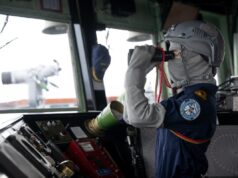



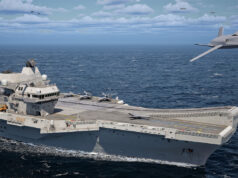

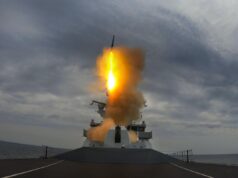

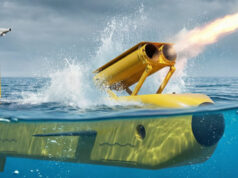
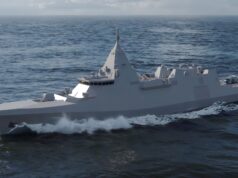

Queue the newspaper comments and the author of this story 😂
A real cockup there for sure if this is the case…………….heads to role😨
On a routine mission, so no excuses if it is in fact the case.
heads to role? Or heads to roll!
Is there any danger of foreign nations obtaining the jet or its technology before we recover it?
Yup. And it’s on the High Seas. Finders Keepers.
Interesting, I read this in my media and thought it was a joke article
No pune intended, but I can’t help thinking this is a cover up. The odds of the ground crew and the pilot missing this at such an early stage in dealing with the planes seems low. Could have happened, but would be extremely unlucky.
A possible cover-up, they can hardly ground all aircraft if Russia is buzzing the carrier. Bad press all around if they did!
Considering that in 96 a groundworker left duct tape on an AeroPeru Boeing 757-200 that lead to it crashing,
something like this can happen
Yeah can happen, but you would expect lessons to be learnt from that case, and miltiary crews to be more by the numbers than an aircrew in Peru
Is there a rain cover on the top inlet where the fan intake is? or we talking the big red ones either side of the fuselage? I doubt you would miss those. This seems as a non story. Red things floating could be anything including items from the ejection/seat?
I would be very surprised if it were, the damage done to the career of those involved especially the pilot would be substantial, perhaps terminal, while such an excuse would be pretty damning on the perceived professionalism that this whole venture and PR campaign has sought to build up. You would be far more likely to try to cover up such incompetence than use it as a cover up surely.
Fair point.
Yes, a pilots durty before takeoff is conduct a visio inspection of the aircraft.
I’m surprised it got started up, let alone rolling, with the intakes corked.
Maybe if it was only corked on one intake?
I agree it seems odd and you would hope that the sensors could pick up the asymmetrical airflow into the intakes as the engine was idling up during preflight.
I don’t think this would happen BIG red intake covers either side of the fuselage you would not miss as a pilot you always do a walk around before you get into a plane whether civvy or military – you would take those out as part of your pre flight checks. Unless there is something more on the top spot where the fan intake is that would be difficult to spot from the ground.
Yes – I’m aware of preflight walk round.
I find it amazing that this could even happen in a four eyes procedure.
The lift fan intake and secondary intake for the engine (opens when the lift fan is running) are both up top. If the story is true, I’d wager it was the cover for one of those intakes that was left on – easier to miss those during a walk around.
That said, I believe the crew chief of a jet is supposed to present the pins/ribbons of all items that are to be removed before flight to the pilot, so they can also verify the necessary stuff has been removed before flight. That’s the procedure I’ve seen with the USN, but I’d expect a comparable procedure for the RN as well.
Perhaps it is time for the RAF to go back to flying from their land air bases, and leave carrier ops to the FAA.
You realise that 617 is a mixed RAF/ FAA Sqn?
Exactly!
I’m surprised that you know it actually was an RAF pilot. Were you aware that FAA pilots are serving on 617?
That also doesn’t absolve RN Carrier deck crew from a share of responsibility if the “cover” story actually has any merit.
unbelievable
If this is the case then more than one person as failed in some way. The last person to who should have checked is the pilot.
Flying ops may be on-going, but if this is the case then I bet there have been some very stern words on board.
Cheers CR
Standard pilot pre flight check – you walk around the plane and check it. 2x big red block in the engine intakes are not difficult to spot. This seems unlikely. Red matter in the water could be from ejection etc.
I know this is slightly off track but small ships flightdeck teams not waffos would have too unleash and stand with Lashings and chocks raised so as the Pilots could count off all deck equipment , Smac233 rules ,this was because The helo fromHms Fife went too take off with the aft lashing still attached whoops .In this case how was the covers missed by both Deckcrew and Pilot ?Someone’s in for a big C126
SMAC232…. Sorry but I think you’re one out.
Sorry typo Smac 233 I did Smac 19 in the 70ts then Smac 233 early 80ts
Tommo! Send code settings please!
Code settings ?
Which rain cover?
The mail seems to be suggesting it’s the red covers over the main engine intakes. If so that seems beyond incompetence but surely someone would spot that as it taxied and prepared for take off run. And surely as the Mail article mentions it was, it would be sucked into the engine which might account for why it wasn’t noticed but then would engine performance not react to that noticeably? But if not one presumes it started to effect it during take off run leading to the incident but then it mentions the cover being seen floating in the sea after the event. How would that cover go through the engine and remain in any state to be recognised floating in the sea afterwards yet not noticeable when in pristine condition on the Intake earlier. But then these discrepancies always seem to be reported in early media coverage so probably best not to try to apply logic.
Those are the ones you see on jetliners and prop airliners that are museum pieces
Confusing story that, as reported, doesn’t seem to make much sense.
You would figure that something big enough to be spotted in the sea from the flight deck would be a fair bit bigger than something like a pitot probe cover.
Meanwhile, if it was an engine intake cover, is it possible that it could have been partially ingested into the intake duct during engine start (and therefore not immediately visible) only to go through the F135 when spooled to full power? If it did, it would have come out the back in lots of pieces, probably accompanied by lots more little pieces of engine and would have created a show for the deck crew and Flyco. Either way, it doesn’t seem likely to have survived intact to go floating in the drink.
If true then that’s unforgivable. Multiple people should have checked something this basic when doing preflight. Frankly it’s in the realms of amateur hour!
Interesting couple of points here:
Immediately raises eyebrows, how could the engine cover survive being ingested by the engine? Was it really an engine cover or something else? There are a LOT of checks on the aircraft before power on and engine start and then the engine is run up to full power before brakes off and take off roll…
Quoting SpazSinbad (a former RAN Skyhawk pilot) over on F16.net:
Im not saying its impossible but Air crash investigations look at the whole failure tree, not just one point of it so its far too early to say exactly what happenend. Take the Sun story with a very big pinch of salt.
For the life of me, I can’t see an engine intake cover being left on. I remember strolling along beside the taxiway and seeing a Canberra taxiing with its control locks still on, a dash to phone, call to ATC solved it. Our Canberra proper practice was for all control lock tags to be in the cockpit before start-up.
Standard Canberra practice on windy days to leave rudder lock in place until A/C lined up on runway.Then removed and shown to pilot prior to roll. I’ve done it many times.
Not buying it. Something so obvious would be spotted immidiately during preflight.
Maybe wait for the outcome of the investigation.
P45 is the only route to take!
Rain cover! what do they mean? pitot static cover, inlet cover (not likely). Seems a bit vague.
hard to believe, the pitot tube covers and static port covers would be too obvious, assuming the Brits use remove before flight streamers like the US and RAAF.
Rain cover? So someone left a Pusser’s Burberry up the intake? Maybe a pair of steaming bats as well?
It is the responsibility of everyone on the flight deck to watch out for pin or cover banners. There surely is some means of giving a warning to the flight controller.
I would have pre-flight checks would have been far more stringent given the relative ’embryo’ status of both the F35B and the QE aircraft carrier. Or has getting to the end of the QE task group ‘jolly’ to the far East and back meant that the sailors are in laid back holiday mode as they cruise through the Mediterranean?
The major problem with the F-35B is that it is such a complicated piece of machinery its automatic systems are constantly monitoring its flight conditions. If at any moment it’s systems suspected that flight was compromised the pilot would be fired out automatically before the plane decided to have a terminal landing with the earth! And the poor old “jockey” would have absolutely no idea why!
I’m suspecting that if the cause was indeed the rain cover, it was the lift fan’s cover rather than the main intakes.
The cover could have been removed correctly! But then incorrectly stowed. Then became FOD.
If they are not grounded it means it was something known right away.
Which points for something bungled…
Sounds like complete bs to me and a cover-up. Even if the cause of the crash was engine failure or some other mechanical failure (or software/avionics failure) they’ll never admit it since people will be asking “So why are we buying flawed aircraft then?”. Everyone with a vested interest in the F-35 programme NEEDS the failure to be human, not mechanical, and will make up any nonsense to ensure that’s the case.
And putting out an unsubstantiated story is simply shoddy journalism and totally unprofessional. Mind you the journalist was probably paid or blackmailed into writing the story.
It’s no secret that the F-35 has over 800 unresolved problems. It’s not a matter of if there’ll be another crash, but when.
The top intake fan has a cover which in flight is closed on take off and landing it is open no need for an additional manually removed cover.
F35B lightning ll
One of our aircraft is still missing it seems, if you know the impact sight, then all it takes is a simple spiral or box grid search pattern, to find the fuselage or what left of the F-35B, even if the the Med is around a mile deep, it should not be that hard to find this RAF F-35B?
Unless the Russian’s have already found her and she on the way to the nearest Russian Navy Base, via Russian Submarine?
The story is inaccurate in at least one point. I understand the pilot didn’t need a helicopter to return to the deck, rather they landed on deck via parachute. MikeR
I did my share of cock ups in my 21 years in air force maintenance, but never one that cost $160 million
Most importantly the pilot is ok.
Very unprofessional if true that the cover was left on.
That’s $115 million down the drain. Will the aircraft be replaced? They don’t have large enough inventory in any case.
Imagine how many people could be saved from the Omicron virus this Christmas for that kind of dough.
Potential interviews without coffees coming up…
Its unbelievable.
Too many person involved if its really the case…
I know, errors can happens, its a fact.
But here its not a small error.
And even if I’m not always gentle with the brits, I just cant imagine this happened in such a profesionnal and trained army.
Just watched the Footage of the aborted take off that apparently was aired on Social media if this was the case, why aren’t there Protocols for sharing sensitive info on line in place ,?
There are strict protocols in place, namely the “Official Secrets Act” of which someone is in direct breach. All members of HM armed forces are subject to the OSA & simply recording the footage was technically an unlawful act, let alone publicly releasing it which was undoubtedly unlawful.
I am aware , I signed that little document in 76 , at that time all personnel were in theory too register any camera and associated equipment with the Reg staff on Ships and Shore establishments ,hardly ever saw that happen though